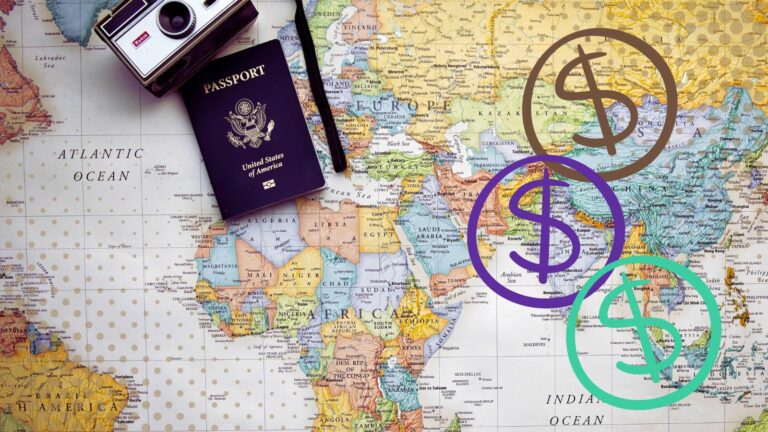Where to Get Non-Resident Library Cards (2025)
One of my main hobbies, even while traveling full-time, is reading books. Nowadays I’m an ebook-only reader, as I’d much rather be able to have dozens of books stashed in my backpack versus a few paper ones.
Also, because I’m a budget traveler, I want to save as much money as I can and put that towards more travel…which means I use my library card basically every day.
If you’re also a big reader wondering how to keep a decent selection of books while traveling, full-time as a nomad, this post is for you! With a little planning, you can snag a library card either before you start your nomad journey, or even while you’re traveling abroad.
This post has a list of book-related resources where you can either access free library collections, or sign up for a non-resident library card. Keep reading for more info!
Just Gone Wandering is supported by readers! This post contains affiliate links. If you click on a link and buy something, I get a small percentage at no extra cost to you. Your support helps keep this blog running— thank you! Read full disclosure here.

Library cards for nomads
So now that you’re no doubt hyped to get a library card, how should a nomad (without a regular home address) go about getting one?
First, sign up at your local library.
If you’re currently still in your home location and not yet traveling, go sign up for a card at your local library. This is the easiest way to get started and well worth the effort. Remember, too, that your local taxes partly go to your local library system, so you might as well get your money’s worth!
Next, check for reciprocal library card agreements.
Reciprocal agreements between libraries mean that residents of nearby counties, cities or states can sign up for library cards without having to pay a non-resident fee.
Many California libraries, for instance, have agreements with each other. California residents can sign up for library cards all up and down the state without having to pay a fee! My home base is in Anaheim, but I have library cards in several large California library systems because of my state’s reciprocal agreements.
Some libraries even have reciprocal agreements with nearby out-of-state counties, like Fairfax County in Virginia which has reciprocal agreements with Washington D.C. and nearby Maryland counties. If you live in a large metropolitan area, or can get to one near your home base, you probably have a chance to get several library cards.
The best place to find out if your state, county or city library system has a reciprocal library card agreement with another system is to check State library websites. They’ll have the most up-to-date information and links to find sister libraries.
Finally, check for non-resident cards at places you frequent.
Many libraries have a kind of visitor pass, where people can get temporary access to computer services, for instance. Some libraries also have non-resident cards, where out-of-state patrons can apply for an electronic library card, either for free or for a yearly fee.
Non-resident library cards can be handy if you spend a lot of time in a particular area, while not being a resident of that area. You’ll get more benefits than a visitor pass, as normally patrons (even non-resident ones!) can check out books and use all library services, either online or in person.
Not all libraries have a non-resident card option, but usually large libraries in cities with a lot of frequent travelers will have something available.
For instance, Los Angeles Public Library has a non-resident card for $50/year, you just have to apply in person.
Note: LAPL is WELL worth getting a card for, especially if you like ebooks. Their collection is HUGE and they constantly add new things. I specifically went up to Los Angeles to get a LAPL card and I don’t regret it.

Free non-resident library cards (sign up online)
If you like reading ebooks or downloading audiobooks, and don’t need access to physical library collection, you have lots of options for non-resident cards! And if you don’t want to have to travel to a library to sign up, you’re also in luck.
Here’s a list of libraries where non-residents can apply for an electronic library card online, and have access to that library system’s electronic collection. Some can be upgraded to also check out physical books, but if you only want ebook/electronic collection access then these are a good option.
Unfortunately, free non-resident library accounts are more rare nowadays, and for most of them you have be a resident of the same state (if it’s US-based).
Carmel Public Library (California)
They have a few ebook apps: ComicsPlus for comics, graphic novels and manga; Palace for ebooks and audios; Libby for ebooks and audios; Enki for ebooks. Looks like their Libby collection is through the Northern California Digital Library which is like a sharing membership for smaller libraries in a specific area.
Address doesn’t seem to be required? Sign up here.
Japan Foundation Los Angeles
Japanese and English books, plus language learning materials. Sign up here. US or Canada residents only.
Librivox (no card required)
A collection of volunteer-read public domain audiobooks. Many languages available, including English (38,274 books), French (999 books), German (2,910 books), Spanish (839 books), Arabic (29 books) and Chinese (431 books).
Mansfield/Richland County Library (Ohio)
Sign up here. Ohio residents only. Their collection is part of The Ohio Digital Library which is a program from the state library.1
Oakland Public Library (California)
Sign up here. Must be California resident and have a form of ID. Cards last 30 days and then you must verify your ID with staff (not clear if this is in-person or online).
Open Library (no card, just an account)
A branch of the Internet Archive, this is a combo book wiki and lending library. It might be a bit confusing to use because not every book listed is available to borrow, and even the available ones might only be available in, like, Spanish vs. English. Visit here.
PINES (Georgia (US state))
Sign up here. Georgia residents only.
Project Gutenberg (no card required)
Over 70,000 free public domain ebooks in a variety of languages, but mostly English. My favorite source for Classics and vintage travel memoirs. Well-formatted files available in multiple formats, including basic HTML for reading on your phone or computer. Visit here.
Queer Liberation Library
Digital (no physical location) library focusing on LGBTQ+ books and resources. Sign up here. US residents only.
Paid non-resident library cards (sign up online)
And here’s a list of other systems where you can sign up online for a non-resident card, but you have to pay a fee. Be sure to check their collections and make sure they have what you’re interested in before forking over the cash.
- Chapel Hill Public Library (North Carolina)
- $65/year – Sign up here.
- Charlotte Mecklenburg Library (North Carolina)
- $45/year or $35/year for adults ages 62+ – Sign up here.
- Enoch Pratt Free Library (Maryland)
- $50/year – Sign up here.
- Fairfax County Library (Virginia)
- $50/year – Sign up here.
- New Orleans Public Library (Louisiana)
- $50/year – More info here.
- Orange County Library System (Florida)
- $75 for 3 months or $125/year – Sign up here. Accepts non-US residents.
- Queens Public Library (New York)
- $50/year – Sign up here. Accepts non-US residents.
No longer available: Houston Public Library, Stark Library
Thank you to everyone who sent an update!
Also: Kindle Unlimited (Subscription)
Particularly good if you enjoy genre fiction written by indie authors, especially romance! I’ve also found excellent travel memoirs and guidebooks– like from Lonely Planet!– in the KU library. You’ll need either a Kindle (I like the Kindle Paperwhite or Kindle Oasis) or a tablet that can access the Kindle app.
Cost: $11.99/month or $7.20/month if you buy a 2 year gift subscription.
Sign up for a free 30 day Kindle Unlimited trial here!
📖Need something to read your library books on? A Kindle Paperwhite is lightweight, anti-glare and the battery lasts forever. Plus if you have a KU subscription, you can browse and download books right on the built-in browser. Perfect for that long bus ride to your next country!
Save to Pinterest


Explore More
Nomad Living
- How to Plan a Year of Full-time Travel
- Packing List for Perpetual Travel (Solo Female Cozy Budget Style)
- Backpack vs. Suitcase for Long-Term Travel
- How to keep in contact while traveling abroad
- The BEST WhatsApp Travel Group Chats
- 90+ Active Facebook Groups for Travelers
- Where to Stay Besides Hotels When Traveling Long-Term
- Travel kitchen essentials | Hotel cooking
- Best Resources for Long-Term Travel
Best Travel Resources
- 👩💻Stay organized with the Deluxe Travel Planner Spreadsheet
- 🛌Search Hostelworld for budget stays
- ✈️Search SkyScanner for discounted flights around the world
- 😺Join TrustedHousesitters and do petsitting in exchange for accommodation
- 💳Carry Chase Sapphire Preferred for a travel-friendly credit card
- 📱Use Airalo for eSIMs around the world
- 🚙Check DiscoverCars for international car rentals
- 👩💻Snag ExpressVPN to stay safe while browsing the web
- 🧑⚕️Sign up with VisitorsCoverage for trip insurance
- Other libraries in this consortium are: Amherst Public Library, Archbold Community Library, Ashtabula County District Library, Auglaize County Public District Library, Avon Lake Public Library, The Public Library of Cincinnati & Hamilton County, Clark County Public Library, Clermont County Public Library, Columbiana Public Library, Community Library (Sunbury), Cuyahoga Falls Library, Delaware County District Library, Franklin-Springboro Public Library, Geauga County Public Library, Great Oaks Institute, Herrick Memorial Library, Kent Free Library, Lane Public Library, Lebanon Public Library, Lima Public Library, London Public Library, Louisville Public Library, Mansfield-Richland County Public Library, Marion Public Library, Mary L. Cook Public Library, Mason Public Library, Massillon Public Library, Muskingum County Library System, North Canton Public Library, Norwalk Public Library, Owens Community College, Portsmouth Public Library, Public Library of Mount Vernon and Knox County, SEO Library Consortium, Shelby County Libraries, Sinclair Community College, Stark County District Library, State Library of Ohio, Stow-Munroe Falls Public Library, Wadsworth Public Library, Westerville Public Library, Wright Memorial Public Library. ↩︎








Love this ! I try to borrow vs buy books as often as possible. I bought a kindle specifically so I have a library in my hands at all times. I do prefer real books, but it’s super helpful while traveling. I also use the Libby app!
I’ve gotten used to my Kindle for reading almost everything, but I’ll admit to still preferring paper guidebooks! 😛
Just checked–the Stark library card is now $100 for out-of-staters.
Oh wow! That’s quite a jump. Thanks for the info– I’ll update the post.
FYI – Broward County in Florida also has a non-resident library card available. It used to be free, but now it’s $50/year, I think.
The Houston public library has updated their policy. No more non-resident library cards. I am so sad
Nice info! FYI, the Chapel Hill Public Library is in Chapel Hill, NC.
Houston is no longer available to non-texas residents. They changed their policy and you cannot get a non-resident card if you live outside of Texas.
Thank you for the update! What a bummer…
We have a Stark non-resident account and have been told that it will not be renewed once it expires. I’ve also seen other report that Stark is no longer offering non-resident cards, even for a fee.
Yes, the option is no longer on their website. Also Fairfax has raised their price to $50.
That’s too bad! 🙁 I’ll update the post with this new info. Thanks for letting me know!